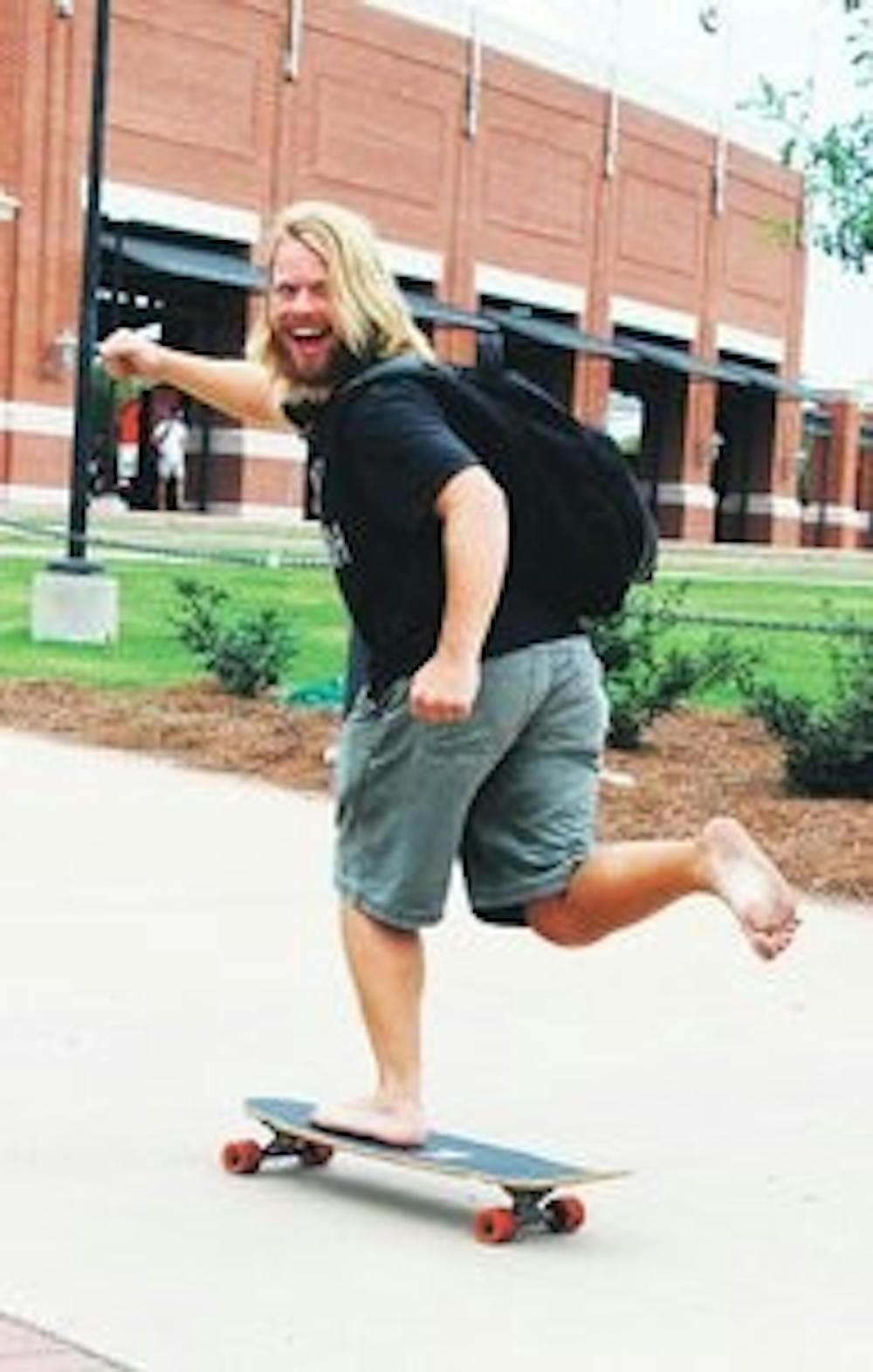Local skateboarders are hoping for a clear set of rules and regulations concerning skateboarding to clear the confusion experienced by the many students and residents who often use skateboards as their primary mode of transportation, as well as for police officers that are unfamiliar with the current laws, and also the techniques of skateboarding.
Numerous skateboarders have been issued costly tickets as a result of unawareness of the contrasting rules and regulations of the city and on campus.
For example, 21-year-old Auburn native Charles Galik, who has used a skateboard to get to his job at Kroger on Glenn and Dean for four years, was pulled over at McDonald's two years ago after traveling at a high speed down the right side of Magnolia.
"I experienced what I felt was harassment and was threatened to be handcuffed on the spot," Galik said.
Galik said the officer accused him of doing tricks in the middle of the road, which he said was impossible because of his high speed.
He said he was then read his rights, but saw it was just a scare tactic after the officer began writing a ticket.
More recently is the incident of Elliot Broder, who recently graduated with a degree in fisheries, still resides in Auburn and also uses a skateboard for transportation daily.
After what Broder said he felt was an innocent ride through empty streets to a late Tuesday afternoon lab last spring, he was pulled over and issued a ticket for disorderly conduct.
Broder said after he researched the charge and watched other court proceedings, he chose to fight the charge in court by explaining to the judge that his experience with skateboards allows him to understand how to remain safe and that the board is important to him because it is his only form of transportation to and from class and work.
"I felt stupid because I had to explain skateboarding terms to the judge, including carving to adjust speed, that (the officer) may have misinterpreted as losing control," Broder said.
Broder said he received a letter stating the charge was dropped because of lack of evidence after the judge dismissed the court, admitting that he was unfamiliar with skateboarding laws, and essentially put the case on hold to discuss the matter with other officials.
Another example is Hunter Dobbins, a senior in creative writing, who has been pulled over on his skateboard at least two dozen times in his two years of living in Auburn by police officers both in cars and on bicycles.
Similar to Broder, Dobbins feels his experience should be taken into account when considering the safety and legal aspects of skateboarding.
"I know how to stop... I know how to use (the skateboard)," Dobbins said. "It is so open for interpretation."
Dobbins said a specific incident occurred last spring semester when he was given a criminal mischief charge for skateboarding across the crosswalk from campus toward Chick-fil-A in front of the engineering building.
He said after he received the charge, he took it directly to a district attorney he had previously consulted with on other similar charges regarding skateboarding.
He said the charge was dropped immediately because of what the district attorney said was uncertain rules and regulations against skateboarding on and off campus.
"When it comes to city and downtown on the roads, I want to know what I can and can't do because different cops tell me different things," Dobbins said.
Dobbins said on-campus police tell him he cannot skate on campus, but that he can skate on the road; and that off-campus police tell him that he can skate on campus, but not on the road.
"(I hope) that we get a strict set of rules of when and where I can skate," Dobbins said.
While section XXII-XI of the city code of ordinances prohibits riding a bicycle and skating with skates, roller blades, skateboards or other similar devices on the sidewalk within the downtown business district, there is no mention of riding or skating on the street.
The downtown business district is defined by the code and the penalty of skating in this area consists of a maximum of $500 in fines and a six-month maximum sentence of hard labor for the city, as stated in section I-IX of the code.
On the other hand, the campus skateboarding policy as defined by the 2012-2013 Traffic and Regulations of AU Parking Services states "the use of skateboards, longboards and the like (minicruisers) is allowed on campus as long as it does not pose a hazard to oneself or others, or potentially cause property damage (to include trick riding) and is in compliance with Alabama state law and University regulations."
Part two of the policy goes on to say that sidewalks that are intended for pedestrian use only include those that are less than 10 feet wide and are not to be skated on, as well as ramps at the Coliseum and any parking deck.
Sidewalks on campus wider than 10 feet are considered shared-use corridors and are open to careful skaters so long as there is no congestion of pedestrians.
A map of these sidewalks can be found on the parking services website.
While the policy does not prohibit skating on the street, it strongly discourages it, whether in bike or vehicle lanes.
"If you see a skateboarder on campus, understand that you don't have to jump out of their way," Dobbins said.
"You're not going to see a new skateboarder trying to (skate among) 2,000 people by the Haley Center."
Do you like this story? The Plainsman doesn't accept money from tuition or student fees, and we don't charge a subscription fee. But you can donate to support The Plainsman.




